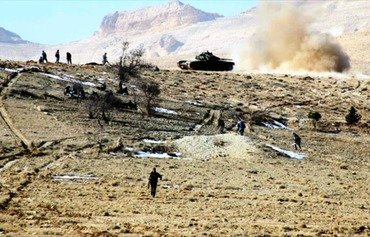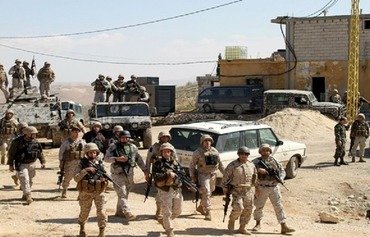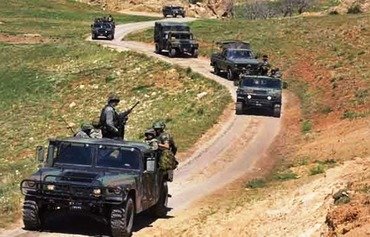Clashes have flared between Lebanon's army and extremist gunmen on the outskirts of the border towns of Arsal and Ras Baalbek since late October, amid fears that a new wave of extremists will seek to infiltrate the area.
While it is unlikely these gunmen will be able to advance on the towns because of the army's readiness and pre-emptive security measures , analysts told Al-Mashareq, residents are keeping a close eye on the fighting in Iraq and Syria, as "Islamic State of Iraq and the Levant" (ISIL) elements are fleeing these areas.
Some Arsal residents say they are worried the battles against ISIL in Mosul and al-Raqa will impact their town, fearing that ISIL elements will try to infiltrate it or take positions on its outskirts and hold Arsal hostage once again.
Residents are "living amid the sounds of the sporadic, almost daily clashes that resumed between the army and ISIL in late October and continue to this day", said Arsal deputy mayor Rima Karnabi.
![The outskirts of the Lebanese border town of Arsal are the scene of constant clashes between Lebanese forces and 'Islamic State of Iraq and the Levant' fighters. [Nohad Topalian/Al-Mashareq]](/cnmi_am/images/2016/11/18/6600-2016-08-03-photo-00000017-600_384.jpg)
The outskirts of the Lebanese border town of Arsal are the scene of constant clashes between Lebanese forces and 'Islamic State of Iraq and the Levant' fighters. [Nohad Topalian/Al-Mashareq]
The echoes of the clashes in nearby Wadi Hmeid "reach deep inside the town and make us fearful of the prospect of ISIL returning to the town once again", she told Al-Mashareq.
Residents are following the course of events in Mosul and al-Raqa closely "and fear that withdrawals there could lead to fighters finding their way to our outskirts" through the porous border region, she said.
However, she added, "we are reassured by the extraordinary and tight measures taken by the army and army intelligence inside the town, at its entrances and in its environs ".
Spillover from Iraq, Syria
"The resumption of clashes between the army and ISIL after a short period of relative calm is somewhat related to the crackdown on the group in Mosul and al-Raqa," said Middle East Centre for Strategic Studies head Brig. Gen. Hisham Jaber, a retired Lebanese army officer.
The army has remained in a state of high alert and readiness so it can respond to any emergency or infiltration attempt from retreating ISIL fighters who try to move into the barren areas along the border with Syria, he said.
The army has been conducting pre-emptive operations on the outskirts of Arsal, he said, where "ISIL has a base that is no longer a launch point [for attacks] but rather a meeting point for its elements who come under pressure [elsewhere]".
"ISIL’s expansion on Lebanon's borders would come at the expense of Fatah al-Sham Front (FSF), formerly al-Nusra Front (ANF)," Jaber said.
"In addition to the clashes between ISIL and the Lebanese army, clashes will ensue between the two groups along the 150-kilometre strip that extends from Arsal to al-Qaa," he said.
Lebanese army ready
The renewed clashes between the army and ISIL on the outskirts of Arsal can be attributed to the battles in Mosul and al-Raqa and pressures ISIL is coming under, said Fadi Ahmar, a researcher and political and strategic sciences university lecturer who specialises in Syria and the Middle East.
As ISIL comes under fire in Iraq and Syria, he said, ANF also is coming under pressure in Aleppo and other pockets of the Syrian provinces of Homs and Hama where it has a presence.
Meanwhile, both ANF and ISIL fighters are trapped on the outskirts of Arsal, he added.
"While ISIL’s military capabilities in Mosul and al-Raqa degrade, both groups are making moves on the outskirts of Arsal to improve their military positions," he said.
ISIL’s moves on the outskirts of Arsal and its clashes with the army appear to be a desperate attempt to carve out a base where it can bring together its elements and secure provisions before winter begins, Ahmar said.
Winter is right around the corner, he added, and the area's high elevation means the weather is "very cold and accompanied by snow".
The army has received reinforcements and is responding to any move along the frontier near Arsal, a mountainous and winding stretch of the border, he added.

![The Lebanese Army has regularly shelled members of the 'Islamic State of Iraq and the Levant' and al-Nusra Front on the country's northern for past few months. [Photo courtesy of the Lebanese Army Facebook Page]](/cnmi_am/images/2016/11/18/6599-lebarmy-600_384.jpg)






